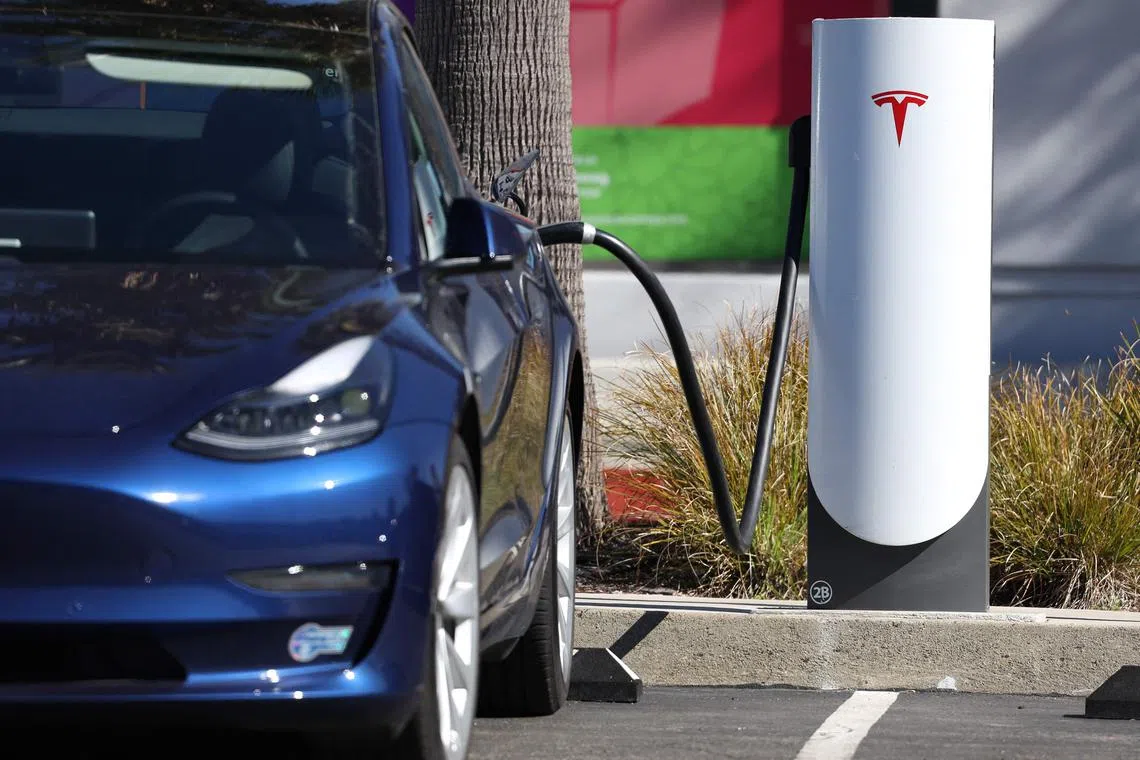Tesla will open some chargers in US to all electric vehicles
Sign up now: Get ST's newsletters delivered to your inbox

Tesla accounts for more than half the fast chargers for EVs in the United States.
PHOTO: AFP
New York – Tesla will open some of its fast chargers, which had been exclusive to its customers, to all electric vehicles (EVs) by the end of next year, the Biden administration said on Wednesday as it announced a broad effort to improve charging and encourage more people to buy battery-powered vehicles.
The company’s network of fast chargers has been a key element in its success by giving drivers confidence that they will be able to charge cars during longer trips. The company’s network also has a reputation for being faster and more reliable than the networks available to owners of EVs made by other manufacturers. Those chargers require drivers to download special apps and are often hard to use or out of commission.
Tesla accounts for more than half the fast chargers in the United States, and its network could provide a significant boost to the Biden administration’s plans to encourage EV ownership and fight climate change. Financial incentives to car buyers and manufacturers are already making some EVs in the US as cheap to buy as comparable petrol cars.
The Biden administration said 7,500 Tesla chargers will be open to other vehicles by the end of 2024. Of those, 3,500 are fast chargers capable of recharging a vehicle in about half an hour to an hour. The rest are slower chargers at hotels, restaurants and other destinations that are already available to owners of other car brands if they buy an adapter.
Tesla has about 17,700 fast chargers in the US, meaning that most of the network will remain closed to EVs made by General Motors, Ford Motor, Volkswagen and others.
Tesla said the opening of its network will be part of a major expansion. “Our US network will more than double by the end of 2024 to support our growing Tesla fleet and new EV customers,” it said on Twitter, without providing further details.
By opening its network, Tesla can earn revenue from owners of its competitors’ vehicles, but may also diminish one of its main advantages as it faces stiffer competition from established carmakers.
“It is a double-edged sword for Tesla,” said Mr Ben Rose, president of Battle Road Research. “It helps to grow the industry. It demonstrates that Tesla wants to be a team player. On the other hand, this reduces a competitive advantage vis-a-vis the other manufacturers that are way behind in creating their own charging networks.”
Tesla already allows other vehicles to use its chargers in a pilot programme in 14 European countries, including France, Germany and Britain. The company’s network in Australia and Iceland is also open to other cars.
Tesla’s decision to open its network means the company will become eligible for some of the US$7.5 billion (S$10 billion) in grant money that Congress authorised as part of a bipartisan infrastructure law passed in 2021. The money is meant to help create a nationwide charging infrastructure. The administration announced rules for the programme on Wednesday, including requirements that the equipment be manufactured in the US, and that chargers function without specialised mobile phone apps and are standardised.
The fragmented charging system in the US is a major frustration for EV owners, who often find that they must download apps and enter personal details and payment information before they can charge. The procedures used to activate charging equipment also differ from company to company, leading to confusion.
The Biden administration’s goal is to build a network of 500,000 chargers in the US by 2030, up from 130,000 today, and increase EV share of new car sales to 50 per cent, compared with 6 per cent last year. All 50 states are participating in a programme designed to line major highways with fast chargers no more than 80.5km apart.
Most owners of electric cars charge their vehicles at home using a dedicated 220-volt connection that can typically fill up a car battery in about eight hours, but that is often not an option for people who rent homes or apartments. Charging electric cars using a standard 110-volt outlet can take up to 60 hours. NYTIMES


